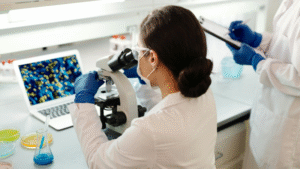In today’s complex healthcare landscape, being an empowered patient is more important than ever. When it comes to breast health, taking an active role in your care can make a significant difference in outcomes. At Pink Medical NY, we believe that informed, engaged patients are best positioned to receive optimal care and achieve the best possible health outcomes. This final installment in our blog series explores how you can take control of your breast health journey with confidence and knowledge.
The Power of Breast Self-Awareness
While formal breast self-examination recommendations have evolved over time, breast self-awareness remains a cornerstone of proactive breast health management:
Understanding Your Normal
Breast self-awareness means becoming familiar with how your breasts normally look and feel so you can recognize changes:
- Regular observation: Become familiar with the normal appearance of your breasts, including skin texture, contour, and nipple characteristics.
- Knowing your typical breast sensations: Understanding what’s normal for you throughout your menstrual cycle helps distinguish concerning changes from normal hormonal fluctuations.
- Recognizing your risk factors: Being aware of personal risk factors informs how vigilant you should be about changes.
Changes Worth Reporting
Being breast aware means knowing which changes warrant medical attention:
- Lumps or thickening in the breast or underarm area
- Changes in breast size, shape, or contour
- Skin changes including dimpling, puckering, redness, or scaliness
- Nipple changes such as inversion, discharge, or erosion
- Persistent pain in one area of the breast
- Swelling of part or all of the breast, with or without skin changes
When you know what’s normal for you, you’re better positioned to detect changes early and bring them to your healthcare provider’s attention promptly.
Building Your Healthcare Team
A strong partnership with healthcare providers forms the foundation of effective breast health management:
Selecting the Right Providers
Consider these factors when assembling your breast health team:
- Expertise and qualifications: Look for providers with specialized training and experience in breast health.
- Communication style: Choose providers whose communication approach aligns with your preferences.
- Collaborative approach: Seek professionals who view you as a partner in your health decisions.
- Accessibility: Consider practical aspects like location, availability, and responsiveness.
At Pink Medical NY, our specialized team is dedicated to breast health and women’s imaging, providing both the expertise and the patient-centered approach essential for optimal care.
Coordinating Your Care
For comprehensive breast health management, coordination among providers is crucial:
- Primary care provider: Oversees your general health and coordinates referrals.
- Breast imaging specialists: Perform and interpret mammography, ultrasound, and advanced imaging like our Koning VeraScan.
- Breast surgeon: Consulted for biopsies and surgical treatment if needed.
- Other specialists: May include genetic counselors, plastic surgeons, oncologists, and others depending on your needs.
Effective communication between these providers ensures that your care is comprehensive and coordinated.
Becoming Your Own Health Advocate
Self-advocacy means taking an active role in your healthcare decisions and ensuring your needs are met:
Preparing for Appointments
Maximize the value of healthcare visits with thorough preparation:
- Document your health history: Keep records of personal and family health history, previous procedures, and test results.
- Track symptoms: Note any breast changes, when they started, and factors that make them better or worse.
- Prepare questions: Write down specific questions before appointments to ensure your concerns are addressed.
- Bring support: Consider having a trusted friend or family member accompany you to important appointments.
Asking the Right Questions
Effective communication with healthcare providers involves asking insightful questions:
About Screening and Testing:
- “Given my risk factors, what screening schedule do you recommend?”
- “What are the benefits and limitations of each screening method for someone with my breast type?”
- “How will I receive my results, and how long will it take?”
- “If something suspicious is found, what are the next steps?”
About Diagnosis:
- “Can you explain what this finding means in simple terms?”
- “What additional tests might be needed to better understand this finding?”
- “How urgent is this situation?”
- “Can I get a copy of my imaging and pathology reports?”
About Treatment Options:
- “What are all my options, including doing nothing?”
- “What are the potential benefits and risks of each option?”
- “How might each option affect my quality of life?”
- “Is there a clinical trial that might be appropriate for me?”
Navigating Disagreements or Concerns
Sometimes you may have concerns about recommendations or feel your needs aren’t being met:
- Express concerns respectfully: Clearly articulate your concerns without becoming confrontational.
- Seek clarification: Ask for explanations in different terms if you don’t understand the information provided.
- Request a second opinion: It’s appropriate to seek another perspective for significant decisions.
- Consider changing providers: If communication consistently fails, finding a provider who better meets your needs may be necessary.
Creating Your Personalized Screening Plan
One-size-fits-all approaches to breast cancer screening are increasingly recognized as suboptimal. A personalized screening plan takes into account your unique risk profile:
Components of a Personalized Plan
A comprehensive screening plan typically addresses:
- Starting age: When to begin regular screening based on your risk factors.
- Screening frequency: How often different types of screening should occur.
- Imaging modalities: Which technologies are most appropriate, such as traditional mammography, the Koning VeraScan, ultrasound, or MRI.
- Supplemental screening: Whether additional screening methods are recommended beyond standard protocols.
- Risk reduction strategies: Lifestyle modifications or medical interventions to reduce breast cancer risk.
Documenting Your Plan
Keep a written record of your screening plan that includes:
- Recommended screening tests and intervals
- Dates of previous screenings and results
- Upcoming appointment schedules
- Provider contact information
- Instructions for accessing results
This documentation helps ensure continuity of care and adherence to screening recommendations.
Navigating Information in the Digital Age
The internet offers unprecedented access to health information, but it can be challenging to distinguish reliable content from misinformation:
Evaluating Online Health Information
Critical evaluation of online resources involves considering:
- Source credibility: Information from medical centers, government health agencies, and established non-profit organizations is generally more reliable.
- Evidence base: Look for content that cites peer-reviewed research and clearly distinguishes between facts and opinions.
- Currency: Medical information evolves rapidly, so check publication dates to ensure information is current.
- Balanced presentation: Credible sources present both benefits and risks of different approaches.
Recommended Resources
These reputable sources provide evidence-based information about breast health:
- National Cancer Institute (cancer.gov)
- American Cancer Society (cancer.org)
- Breast Cancer Research Foundation (bcrf.org)
- National Comprehensive Cancer Network (nccn.org)
- Susan G. Komen Foundation (komen.org)
Social Media and Health Apps
Approach social media content and health apps with appropriate caution:
- Support communities: Online support groups can provide valuable emotional support and practical tips, but medical advice should be verified with healthcare providers.
- Health tracking apps: Apps that help track symptoms, appointments, and medications can be useful tools, but ensure they have strong privacy protections.
- Risk assessment tools: Online risk calculators can provide general information but shouldn’t replace professional risk assessment.
Building Your Support Network
A strong support system is invaluable throughout your breast health journey:
Types of Support
Different types of support serve different needs:
- Emotional support: From friends, family, or support groups who provide understanding and encouragement.
- Practical support: Help with transportation, childcare, meals, or other daily needs.
- Informational support: Access to reliable information and guidance through the healthcare system.
- Professional support: Counselors, therapists, or social workers who can help navigate the emotional aspects of breast health concerns.
Finding Support Resources
Helpful support resources include:
- Local and online support groups
- Hospital-based support services
- Community organizations
- Faith-based supports
- Professional counseling services
At Pink Medical NY, we can help connect you with appropriate support resources based on your specific needs.
Integrating Breast Health into Overall Wellness
Breast health doesn’t exist in isolation—it’s an integral part of your overall well-being:
Holistic Approaches to Breast Health
A comprehensive approach integrates:
- Physical wellness: Regular physical activity, nutritious eating patterns, adequate sleep, and limited alcohol consumption all contribute to breast health.
- Emotional wellness: Stress management strategies and attention to mental health support overall well-being and may influence breast health.
- Environmental wellness: Minimizing exposure to potential environmental toxins may reduce breast cancer risk.
- Social wellness: Strong social connections provide support and may positively impact health outcomes.
Work-Life Balance and Health Priorities
In busy lives, health priorities often compete with other responsibilities:
- Scheduling regular self-care: Block time for health-related appointments and activities.
- Communicating needs: Let family and colleagues know about important health priorities.
- Delegating when possible: Share responsibilities to create time for health management.
- Using available resources: Take advantage of workplace wellness programs, flexible scheduling, and other supports.
The Pink Medical NY Approach to Patient Empowerment
At Pink Medical NY, we’re committed to supporting your journey as an empowered patient:
Our Patient-Centered Philosophy
Our approach is built on:
- Respect for patient autonomy: We recognize your right to make informed decisions about your care.
- Transparent communication: We provide clear, comprehensive information about findings, recommendations, and options.
- Shared decision-making: We work collaboratively with you to develop screening and care plans aligned with your values and preferences.
- Responsiveness to individual needs: We acknowledge that each patient has unique concerns, priorities, and communication preferences.
How We Support Your Empowerment
We offer practical support through:
- Comprehensive education: We provide detailed explanations of procedures, findings, and recommendations.
- Convenient access to results: We ensure timely delivery of results through secure channels.
- Coordination with other providers: We communicate effectively with your other healthcare providers to ensure continuity of care.
- Advanced technology: Our state-of-the-art Koning VeraScan and other imaging technologies provide superior information to guide your healthcare decisions.
Taking the Next Step
Empowerment begins with a single step. Here’s how to start taking control of your breast health journey:
- Schedule a comprehensive risk assessment: Understanding your personal risk factors provides the foundation for all other breast health decisions.
- Develop your screening plan: Work with our specialists to create a personalized screening protocol based on your risk profile.
- Experience advanced imaging: If appropriate for your situation, experience the comfort and precision of our Koning VeraScan technology.
- Stay engaged: Maintain your breast self-awareness, adhere to your screening schedule, and continue educating yourself about breast health.
At Pink Medical NY, we’re here to partner with you at every step of your breast health journey. Contact us today to schedule your consultation and take that crucial first step toward becoming an empowered patient.
This information is provided for educational purposes only and is not intended to replace the advice of your doctor or healthcare provider. Please consult with your healthcare provider regarding specific medical conditions and treatments.





